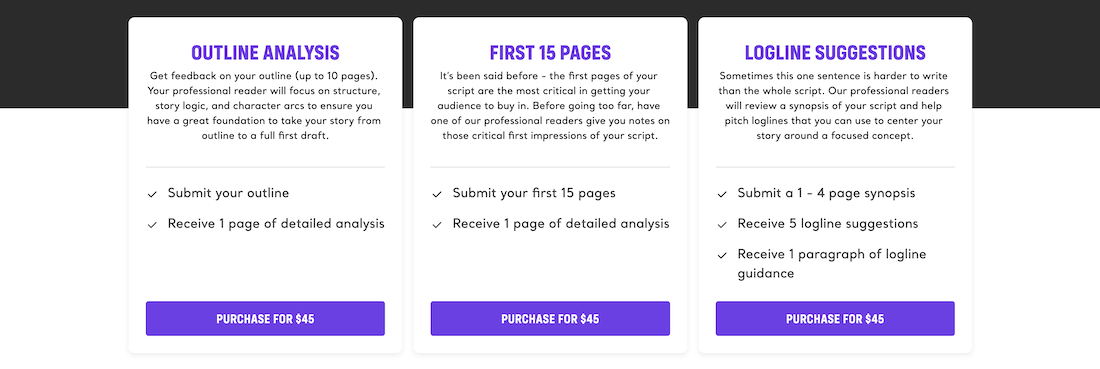One of the best ways a screenwriter can get their foot in the door of this extremely competitive business is through screenwriting competitions and fellowships. That’s how TV and feature screenwriter Amadou Diallo, and many other talented writers, launched his career. Diallo has staffed three TV shows and recently sold his first feature, all while trying to navigate the post-strike world of Hollywood.
While competitions can often be discouraging for new screenwriters who don’t place, Diallo has found what competitions can help writers and how to stay motivated to continue investing in yourself as you continue to write, enter, and (hopefully) win.
I sat down with Diallo to talk about all things competitions, from what to look for in competitions and prepping your screenplay before submitting, to landing representation.
Editor’s Note: This interview has been edited for clarity and length.
ScreenCraft: When did you start submitting to competitions? How did you measure your progress with competitions?
Amadou Diallo: Yeah, that’s a great question. I think once I decided to make the transition to screenwriting, and when you get your first pilot written, you maybe have a couple of people read it, and then, of course, it’s the whole competition thing, “What should I enter? How many should I enter?” I started that [with] probably one strong pilot when I entered. I had just one thing that I was entering in, I was just looking today to add a spreadsheet of all of the submissions I had done, and it was an investment.
With contests, the thing that I came to realize was that they’re not so helpful as like one-offs because of the anonymity of the reader. You don’t know who’s reading it. So if you’re just going say, “I’m going to submit one thing to one contest, and that’ll tell me if I’m a good screenwriter or not,” like you can’t really do that. But I think if you can take them in the aggregate, if you can afford to make the investment in submitting multiple ones, over time, you can sort of see, OK, maybe the first year, nothing made it out of the first round. Then the next year, I had some pieces make it to the second round semis, quarterfinals, and things like that is a progression that I can see in my work. Then getting into the second round, quarterfinal semis, and then you enter some bigger competitions and getting in [the] second round of the Austin [Film Festival competition].
It was useful for me in that broader sense of like, just taking a look as a whole, my submissions have done better over time in this range of competitions. I did try to be intentional about not entering something where there are 20 entries so you’re going win something, but entering some bigger contests and medium-sized ones to gauge, but I think it’s definitely a long game.

SC: When did you start seeing some real results from competitions? And what does that look like?
AD: It was literally like, do I make it out of the first round? How early do you get that rejection letter? I think that the first year was pretty brutal. I think the second year I was doing and I started getting a little more traction. What helped was [that] I had multiple things to submit, you know, so I only had one pilot the first year, second year, I had written two more.
That’s another thing that competitions can be very helpful for as sort of a prod to produce output. I look back to one of the biggest benefits of the competition thing from 2019 to now, I think consistently, every year, I’ve written at least two original things, whether it’s a pilot or a feature. You know, I spent a long time on a pitch document a verbal pitch, so I count that because of that. That was harder than just writing the pilot. So I think again, that was when I started to see the progression, when I stared producing more output. And [looking to see if] those pieces now getting better traction in those in those competitions.
Read More: How to Win a Screenwriting Contest, Competition, or Fellowship
SC: Now, when you look at the competitions that you selected to submit you, what what will qualify them for you? Are there specific prizes you were looking for? What were the ones that that really appealed to you?
AD: I think for me, it was a name recognition, you know, going on Twitter and seeing what competitions people talk about, and you get the flurry of people waiting on first-round decisions. So, you hear about the big ones like Final Draft [Big Break], Austin, and [Academy] Nicholl. Then there are a lot of ones like WeScreenplay and ScreenCraft, those kinds of ones I didn’t want to do. But I think if I had heard other writers talk about them, then that was the gauge.

SC: And eventually, your writing started to really pop with competitions. I know you did really well with tracking board with the Launch Pad competition. And also mentorship matters. Can we talk about what that created for you what those wins built for you?
AD: I think it’s funny, those two you mentioned are my only two wins from contests. The tracking board Launch Pad one was good because you just need wins during this process of trying to break in. There are so many rejections, you need these little external validations of like, “Yeah, you’re on the right track.” So that was really helpful.
The mentorship matters. That was the only fellowship I’ve ever won. And that was crucial for me in my career because that came with a 12-month, one-on-one mentorship with a showrunner. That was life-changing in a lot of ways because, there are two elements to this one, trying to just get your work to the level that it needs to be to get to that mythical, undeniable spirit. But once you feel like you’re ready, or when people tell you that you’re ready, you need access you need, you need to build relationships with people who are in the industry who are doing what you want to do. It was what mentorship matters was, with my mentor, Melanie Marnich. From the jump, we established a great relationship. We’re friends to this day. We’ll text, wanting to check in with [each other]. I celebrate her when she celebrates my wins.
The missing piece, the piece that’s hardest to get, is the connection relationship, which is where the value lies in the fellowships. I know that for the Launch Pad, what that did was… I didn’t have a manager when I hit one that, and so I started getting calls from managers. I’ll be honest with all of them, maybe three or four that reached out. And none of them were ideal. None of them were good fits by a long shot. But it was very valuable because I got to see what I didn’t want or wasn’t what I was looking for in a rep. When I did meet my manager that I have now it was such a night and day, I was like, “Oh, this is what it’s supposed to feel like when somebody says they’re interested in you.”
As maybe overwhelming as those initial manager sit-downs were, they were still coming to me. And it would have been even worse if I had just been going out to managers blindly. So I think contest and offered that. Again, that’s access to build relationships with people in the industry. That’s super important.
Read More: The Importance of Mentorship in Writing Careers

SC: Now to any writers who are watching this, who are building their career trying to figure out their path in and considering competitions. What do you think they should think about when debating to submit not to submit what to submit?
AD: As I said in the beginning, you can’t look at [contest] as one-offs to judge your value. As a writer, that’s not what they’re built for. In conjunction with the contest, you need people in your circle to read, you need readers who you know. Your reader doesn’t have to be Steven Spielberg. But it needs to be somebody that you know so you can take their perspective and experience into account. If I send my script to read to a showrunner and they have notes about it, I take that a certain way versus if a peer of mine in my writers’ group writes a completely different genre than I do, how do I feel about their work? Knowing that person, you can kind of filter out what’s useful to you and what you maybe need to leave to the side, which is hard to do with contests.
The contests are like a great cherry on the top once you have a circle of readers that you trust, and it will give you honest feedback. That helps when it’s time to submit to some contest to just some blind readers, because, again, the first round of contests is really a crapshoot. There’s maybe the perception that when you submit to a contest with a name like an Oscar-winning director, whoever is on the jury panel. That’s not who’s reading your work in the first round. It’s somebody who’s getting paid whatever to read it, and they could be anybody and they could be having a bad day, they could have just broken up with their partner that morning, and they read your rom-com and it’s just like, “This sucks.”
For your script to get traction in contests, it has to really, really stand out and be strong. You can’t account for the taste of this anonymous reader. What you can do is that if you submit something that has a strong POV that has your voice. That’s not cookie-cutter, and that’s not just copying everything that we’ve seen on TV. You have a really good shot because having read for a couple of fellowships now, 99% of what you get feels like a collection of TV shows that you’ve seen already, which I get, makes sense. If you’re going to write for TV, why shouldn’t you write things that sound just like what you’ve seen on TV? But the reality is, that’s not what most people are looking for. They’re looking for a voice, they’re looking for passion, they’re looking for a vision, and if you can give that I think your chances of you know certainly getting past that first round, hurdle, and contest are good. So you can use it as a gauge as a gauge of that.
Read More: How Do Screenwriters Know When to Embrace or Reject Notes and Feedback?
Check out our Preparation Notes so you start your story off on the right track!
The post Amadou Diallo Shares How To Make Screenwriting Competitions Work for You appeared first on ScreenCraft.
Go to Source
Author: Lee Jessup

